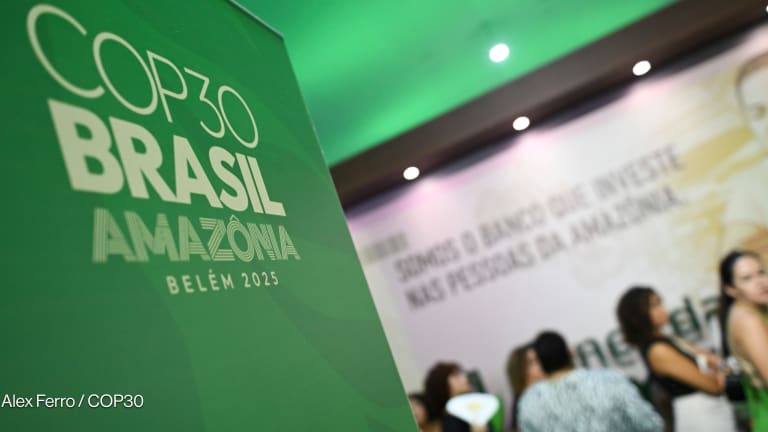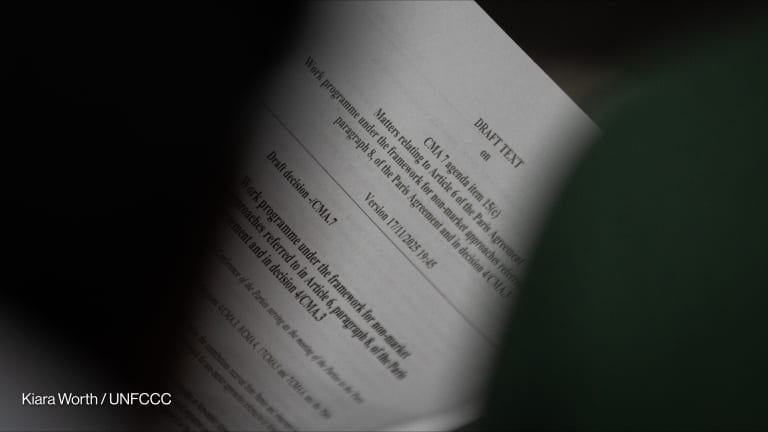All hands on deck: Trends in funding for marine conservation
A new report from the Packard Foundation — released ahead of the United Nations Ocean Conference — highlights recent changes and growing opportunities in funding for marine conservation.
A report released the same day the United States announced its decision to withdraw from the Paris Agreement on climate change highlights new funding opportunities for marine conservation driven by private philanthropy, in combination with development banks and aid agencies. The report, commissioned by the David and Lucile Packard Foundation, provides an overview of recent increases in funding for marine conservation — but suggests that NGOs working on the issue need to develop projects with a more attractive risk and return profile for investors. “What we're hoping this report can do is deliver a really strong message of hope that, when well managed, ocean resources can simultaneously thrive alongside sustainable development,” Meg Caldwell, deputy director of the ocean program at the Packard Foundation, told Devex. Released ahead of next week’s Ocean Conference at the United Nations — and coincidentally falling on the same day as President Donald Trump’s announcement — the publication provides an overview of the greatest threats facing our oceans, the solutions that already exist, and the opportunities for funders to fill the remaining gaps. The Ocean Conference, running from June 5-9 in New York, will see stakeholders come together to support the implementation of Sustainable Development Goal 14: The conservation and sustainable use of the ocean for sustainable development. “There's going to be a lot of bad news, we know, in many of the presentations, but keeping our eyes on the collective prize is absolutely essential,” Caldwell said. Alignment of interests One of the major takeaways from the report is how the activities of development banks and private foundations are converging within the field of marine conservation. Philanthropy — which originates primarily from the U.S. — has traditionally invested in fisheries and protected areas in North America. But the sector is beginning to diversify its grantmaking, expanding its geographic scope into areas of Asia and South America, where the development community is involved in conservation. “It’s a pretty exciting transition,” Caldwell said. “The solutions to challenges like poverty alleviation, food security and economic development can actually be the same solutions that we are seeing for ocean conservation.” The report points to illegal, unreported or unregulated fishing — which may account for as much as 53 percent of catch — as one example of this. Increasingly, donors such as the U.S Agency for International Development are signing memorandums of understanding with private foundations, including the Packard Foundation, with the joint goals of fisheries management and food security, Caldwell said. The report offers a few key ways the global development community can draw investors to sustainable fishery projects by helping them find a risk and return profile they can justify. Writing in one of several “expert insights” included in the report, Larry Band, director of the California Fisheries Fund, said that to stimulate significant non-grant investment flows “we need to focus on the hard work of developing a robust pipeline of projects with an attractive risk profile for investors. The key to success will be building stronger risk-mitigation capabilities.” The conservation and development communities have pursued their ocean priorities on two separate financial tracks, wrote Miguel Angel George, senior fisheries specialist at the World Bank, in another expert insight. “This alignment of interests between conservation and development is much more than philosophical: If acted upon, it should leverage diverse financial and human resources and drive innovation and greater positive social and environmental impact,” he wrote. He called for blended capital — grants, development aid and loans — to rebuild fisheries, explaining that while the costs may be significant, the benefits would be far greater. Together, capital from the philanthropic sector and the multilateral development banks can reduce investment risk in the fisheries sector, he said, suggesting that grantmakers focus on two mutually reinforcing goals: Healthy fish ecosystems and healthy fishing economies. Changes in funding for marine conservation The report compares ocean funding from a variety of sources, with further information available at fundingtheocean.org. Much has changed in where and how organizations are investing in ocean conservation over the past two years. The Packard Foundation highlights three topics as essential for the future health of the oceans: Tackling overfishing, mitigating the effects of climate change, and better understanding and management of the growing number of threats facing the marine environment. --— For example, at the Our Ocean conference in Washington, D.C., last September, a range of new investment partnerships were announced, including the Blue Abadi Fund, which is highlighted as a success story in the report. Vulcan, founded by Microsoft co-founder Paul Allen, has also become more engaged in philanthropy for ocean conservation over the past two years, having recently participated in a workshop in technology solutions for fisheries challenges at the Packard Foundation. The foundation hopes to release a similar report every two years moving forward, Caldwell said. The top five philanthropic funders in ocean conservation are the Moore Foundation, Packard Foundation, Walton Family Foundation, Marisla Foundation, and Oak Foundation, according to the report. But there has been increased investment from other donors, such as the Bloomberg Family Foundation, which made a $50 million commitment to promoting fisheries reform in Brazil, Chile and the Philippines through its Vibrant Oceans Initiative. The report also notes an evolution in the theory of change, from growing recognition of the need to improve fishery management beyond marine protected areas, to growing interest in market-based incentives, such as increased investments in seafood markets. The Packard Foundation highlights three topics as essential for the future health of the oceans: Tackling overfishing, mitigating the effects of climate change, and better understanding and management of the growing number of threats facing the marine environment. “The magnitude of the challenge across just these three areas far outstretches our own foundation's ability to tackle them alone,” Caldwell said. “We need collaborative work here, and all hands on deck.” Read more international development news online, and subscribe to The Development Newswire to receive the latest from the world’s leading donors and decision-makers — emailed to you free every business day.
A report released the same day the United States announced its decision to withdraw from the Paris Agreement on climate change highlights new funding opportunities for marine conservation driven by private philanthropy, in combination with development banks and aid agencies.
The report, commissioned by the David and Lucile Packard Foundation, provides an overview of recent increases in funding for marine conservation — but suggests that NGOs working on the issue need to develop projects with a more attractive risk and return profile for investors.
“What we're hoping this report can do is deliver a really strong message of hope that, when well managed, ocean resources can simultaneously thrive alongside sustainable development,” Meg Caldwell, deputy director of the ocean program at the Packard Foundation, told Devex.
This story is forDevex Promembers
Unlock this story now with a 15-day free trial of Devex Pro.
With a Devex Pro subscription you'll get access to deeper analysis and exclusive insights from our reporters and analysts.
Start my free trialRequest a group subscription Printing articles to share with others is a breach of our terms and conditions and copyright policy. Please use the sharing options on the left side of the article. Devex Pro members may share up to 10 articles per month using the Pro share tool ( ).
Catherine Cheney is the Senior Editor for Special Coverage at Devex. She leads the editorial vision of Devex’s news events and editorial coverage of key moments on the global development calendar. Catherine joined Devex as a reporter, focusing on technology and innovation in making progress on the Sustainable Development Goals. Prior to joining Devex, Catherine earned her bachelor’s and master’s degrees from Yale University, and worked as a web producer for POLITICO, a reporter for World Politics Review, and special projects editor at NationSwell. She has reported domestically and internationally for outlets including The Atlantic and the Washington Post. Catherine also works for the Solutions Journalism Network, a non profit organization that supports journalists and news organizations to report on responses to problems.








